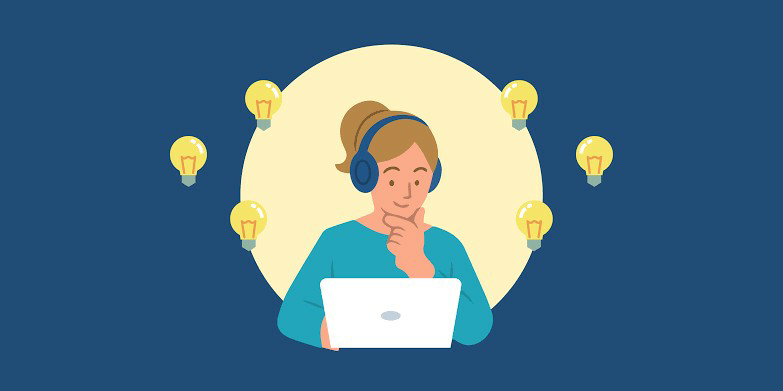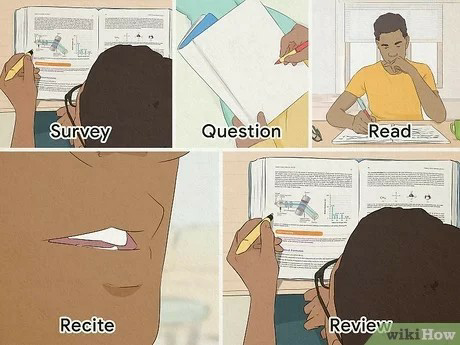1. Try a five-step approach:
survey, question, read, recite, and review. This is called SQ3R or SQRR and is a study method that involves active reading which helps with comprehension and learning the material. The method gets you to preview the material and actively read so you are more prepared when you read a chapter or article.
Start with Survey, which means to glance through the chapter to look for tables, figures, headings, and any bold words.
Then Question by making each heading into a question.
Read the chapter while trying to answer the questions you made from the section headings.
Recite the answers to the questions verbally and any important information you remember from the chapter.
Review the chapter to make sure you include all the main ideas. Then think about why this is important.
2 .Use the THIEVES strategy.
When you are beginning to study a new chapter, it will make the information it contains much more meaningful and easier to learn if you preview the chapter using THIEVES.
Start with the title. What does the title tell you about the section/article/chapter? What do you already know about the topic? What should you think about while reading? This will help you frame your reading.
Scan the "headings" and subheadings. What do these headings and subheadings tell you about what you will be reading? Turn each heading and subheading into a question to help guide your reading.
Move to the introduction. What does the introduction tell you about the reading?
Read the first sentence of every paragraph. These are generally topic sentences and help you think about what the paragraphs will be about.
Look at the visuals and vocabulary. This includes tables, graphs, and charts. More importantly, look at the bolded, italicized, and underlined words, words or paragraphs of a different color, and numerical lists.
Read the end of chapter questions. What concepts should you know by the time you finish reading the chapter? Keep these questions in mind as you read.
Look at the chapter summary to get a good idea of what the chapter is about before going on to read the chapter as a whole
3. Highlights important details.
Use a highlighter or underline the most important points in the body of the text, so that you can spot them more easily when you review the material.Don't highlight everything - that defeats the purpose. Instead, only highlight the most important phrases and words It also helps to make notes in pencil in the margin in your own words to summarize or comment on important points.
You can also readjust these portions to quickly review the material you have learned while it is still fresh in your memory, and help the main points to sink in.
If the textbook belongs to the school, then you can use highlighted sticky notes or a regular sticky note beside the sentence or paragraph. Jot your notes on a sticky note and paste them beside the paragraph.
It's also a good way to periodically review in this manner to keep the main points of what you have already learned fresh in your mind if you need to remember a large amount of material for a longer period, like for a final examination, for a comprehensive exam in your major, for a graduate oral, or entry into a profession.
4.Summarize or outline the material.
One good way to study is to write the material in your notes and the textbook in your own words. That way you can think about it in your terms instead of textbook language. Incorporate your summaries into your notes, if there is a connection. You can also outline. Organize it by main ideas and only the most important subpoints.
If you have enough privacy, it also helps to recite your summaries aloud to involve more senses. If you are an aural learner or learn better when verbalizing it, then this method could help you.
If you're having trouble summarizing the material so that it sticks in your head, try teaching it to someone else. Pretend you're teaching it to someone who doesn't know anything about the topic, or create a wikiHow page about it! For example, How to Memorize the Canadian Territories & Provinces was made as a study guide for an 8th-grade student.
When making summaries, use different colors. The brain remembers information more easily when it is associated with color.
5.Make flashcards.
This is usually done with index cards. Place a question, term, or idea on one side of a flashcard and have the other side contain the answer. These are convenient because you can carry them around with you and study them when you are waiting for the bus, for class to start, or have a few down moments.
You can also download computer programs that cut down on space and the cost of index cards. You can also just use a regular piece of paper folded (vertically) in half. Put the questions on the side you can see when the paper is folded; unfold it to see the answers inside. Keep quizzing yourself until you get all the answers right reliably. Remember: "Repetition is the mother of skill."
You can also turn your notes into flashcards using the Cornell note-taking system, which involves grouping your notes around keywords that you can quiz yourself on later by covering the notes and trying to remember what you wrote based on seeing only the keyword.
6.Make associations.
The most effective way to retain information is to tie it to existing information that's already lodged in your mind. Using memory techniques can help you remember difficult or large amounts of information.
Take advantage of your learning style. Think about what you have already learned and remember easily--song lyrics? choreography? pictures? Work that into your study habits. If you're having trouble memorizing a concept, write a catchy jingle about it (or write lyrics to the tune of your favorite song); choreograph a representative dance; draw a comic. The sillier and more outrageous, the better; most people tend to remember silly things more than they remember boring things.
Use mnemonics (memory aids). Rearrange the information in a sequence that's meaningful to you. For example, if one wants to remember the notes of the treble clef lines in music, remember the mnemonic Every Good Boy Deserves Fudge = E, G, B, D, F. It's much easier to remember a sentence than a series of random letters.You can also build a memory palace or Roman room to memorize lists like the thirteen original colonies in America in chronological order. If the list is short, link the items together using an image in your mind.
Organize the information with a mind map. The result of mapping should be a web-like structure of words and ideas that are somehow related in the writer's mind.
Use visualization skills. Construct a movie in your mind that illustrates the concept you're trying to remember, and play it several times over. Imagine every little detail. Use your senses--how does it smell? Look? Feel? Sound? Taste?
7.Break things into smaller parts.
One way to study is to break things into smaller sections. This helps you learn the information bit by bit instead of trying to understand everything at once. You can group things by topic, keywords, or any other method that makes sense to you. The key is to lessen how much information you learn at one time so you can focus on learning that material before moving on.
8.Make a study sheet.
Try to condense the information you will need into one sheet, or two if necessary. Bring it around with you and look at it whenever you have downtime during the days leading up to the test. Take your notes and the chapters and organize them into related topics and pull out the most important concepts.
If you type it up onto the computer, you can get a lot more control over your layout by changing font sizes, margin spaces, or bullet lists. This can help if you are a visual learner







.jpeg)

